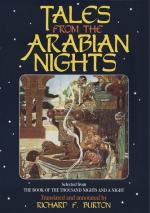[FN#65] This passage is not Koranic, and, according to Prof. Houdas, the word “Muhkaman” is never found in the Holy Volume. [The passage is not a literal quotation, but it evidently alludes to Koran iii. 5: “Huwa’llazi anzala ’alayka ’l-kitaba minhu ayatun muh-kamatun” = He it is who sent down to thee the book, some of whose signs (or versets) are confirmed. The singular “muhkamatun” is applied (xlvii.) to “Saratun,” a chapter, and in both places the meaning of “confirmed” is “not abrogated by later revelations.” Hence the sequel of my first quotation these portions are called “the mother (i.e. groundwork) of the book,” and the learned Sayyid is not far from the mark after all.—St]
[FN#66] Surah ii. (The Cow) v. 56, the verse beginning, “Allah! there be no God but He; ... His Throne overreacheth the Heavens and the Hearth,” etc.
[FN#67] Surah lxxiii. (The Bee) v. 92, ending with, “And he forbiddeth frowardness and wrong-doing and oppression; and He warneth you that haply may ye be warned.”
[FN#68] Surah (Meccah) xcix. vv. 7 and 8: in text “Mithkala Zarratin,” which Mr. Rodwell (p. 28) englishes “an atom’s weight of good,” and adds in a foot-note, “Lit. a single ant.” Prof. Houdas would render it, Quiconque aura fait la valeur d’un mitskal de millet en fait de bien; but I hardly think that “Zarrah” can mean “Durrah” = millet. ["Mithkal” in this context is explained by the commentators by “Wazn” = weight, this being the original meaning of the word which is a nomen instrumenti of the form “Mif’al,” denoting “that by which the gravity of bodies is ascertained.” Later on it became the well-known technical term for a particular weight. “Zarrah,” according to some glossarists, is the noun of unity of “Zarr,” the young ones of the any, an antlet, which is said to weigh the twelfth part of a “Kitmir” = pedicle of the date0fruit, or the hundredth part of a grain of barley, or to have no weight at all. Hence “Mukhkh al-Zarr,” the brains of the antlet, means a thing that does not exist or is impossible to be found. According to others, “Zarrah” is a particle of al-Haba, i.e. of the motes that are seen dancing in the sunlight, called “Sonnenstaubchen” in German, and “atomo solare” in Italian. Koran xxi. 48 and xxxi. 15 we find the expression “Mithkala Habbatin min Khardalin” = of the weight of a mustard-seed, used in a similar sense with the present quotation.—St]
[FN#69] Surah lxx. 38, Mr. Rodwell (p. 60) translates, “Is it that every man of them would fain enter the Garden of Delights?”
[FN#70] Surah xxxix. 54: they sinned by becoming apostates from Al-Islam. The verset ends, “Verily all sins doth Allah forgive: aye, Gracious, and Merciful is He.”
[FN#71] Surah ii. 159; the quotation in the Ms. is cut short.
[FN#72] Surah ii. 107; the end of the verse is, “Yet both are readers of the Book. So with like words say they (the pagan Arabs) who have no knowledge.”




